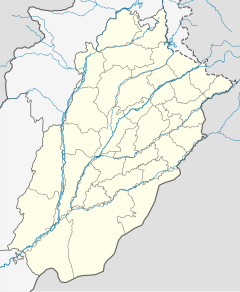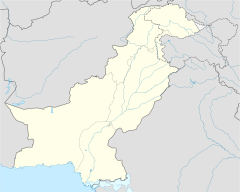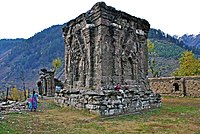
Rawalpindi is a city in the Punjab province of Pakistan. It is the fourth most populous city in Pakistan and third most populous in Punjab according to 2017 Census. Rawalpindi is situated close to Pakistan's capital Islamabad, and the two are jointly known as the "twin cities" because of the social and economic links between them.

Holi is a popular and significant Hindu festival celebrated as the Festival of Colours, Love, and Spring. It celebrates the eternal and divine love of the deities Radha and Krishna. Additionally, the day signifies the triumph of good over evil, as it commemorates the victory of Vishnu as Narasimha over Hiranyakashipu. Holi originated and is predominantly celebrated in the Indian subcontinent, but has also spread to other regions of Asia and parts of the Western world through the Indian diaspora.
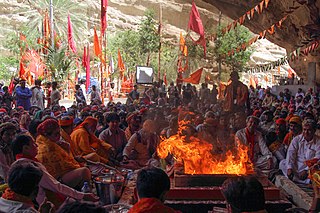
Hinduism is the second largest religious affiliation in Pakistan after Islam. While Hinduism was one of the dominant faiths in the region a few centuries back, today Hindus account for only 2.14% of Pakistan's population or about 4.4 million people according to the 2017 Pakistani census, although Pakistan Hindu Council has claimed that there are 8 million Hindus living in Pakistan, making up 4% of the country's population. The Umerkot district has the highest percentage of Hindu residents in the country at 52.2%, while Tharparkar district has the most Hindus in absolute numbers at 714,698.

The Shri Katas Raj Temples, also known as Qila Katas, is a complex of several Hindu temples connected to one another by walkways. The temple complex surrounds a pond named Katas which is regarded as sacred by Hindus. The complex is located in the Potohar Plateau region of Pakistan's Punjab province. The temples are located in municipal committee Choa Saidanshah, and are near the M2 Motorway.

The BAPS Shri Swaminarayan Mandir of Chicago, Illinois is a traditional Hindu place of worship built by the BAPS Swaminarayan Sanstha. The BAPS Swaminarayan Sanstha, which is headed by Mahant Swami Maharaj, is a denomination of the Swaminarayan Sampradaya within Hinduism. The mandir is located in the Chicago suburb of Bartlett and opened on August 7, 2004. It was built of hand-carved Italian marble and Turkish limestone. The mandir is the largest of its kind in Illinois and was constructed in accordance to the Shilpa shastras. The mandir complex spreads over 27 acres and includes the mandir and the haveli.

The Krishna Mandir is a Hindu temple (mandir) dedicated to the Hindu deity Krishna located in Ravi Road, opposite of Timber Market in Lahore, Punjab, Pakistan. In 2006, the temple became a centre of controversy due to media reports on its demolition which later turned out incorrect. In the contemporary era, it is one of two functional Hindu temples in Lahore, the other being Valmiki Mandir.

The Shri Swami Narayan Mandir, Karachi is a Hindu temple that is the only Swami Narayan temple in Pakistan. The temple is notable for its size and frontage, over 32,306 square yards (27,012 m2) on the M. A. Jinnah Road in Karachi city. The temple celebrated its anniversary of 216 years in April 2004. There is a sacred cowshed within the premises of this temple. The temple is located at the centre of a Hindu neighbourhood in Karachi. The building that housed a dharmshala for visiting devotees has now been converted to the office of the City District Government.

Shri Durgiana Mandir, is a Hindu temple situated in the city of Amritsar in Punjab, India. Though a Hindu temple, its architecture is similar to the Sikh Harmandir Sahib. This temple derives its name from the Goddess Durga, the chief Goddess who is worshipped here. Murtis of Lakshmi and Vishnu are also located and worshipped in the temple.

ISKCON Vrindavan, also called Sri Sri Krishna Balaram Mandir, is one of the major ISKCON temples in the world. It is a Gaudiya Vaishnava temple located in the city of Vrindavan, Mathura district, in the Indian state of Uttar Pradesh. The temple is dedicated to the Hindu gods Krishna and Balarama. The other deities of temple are Radha Krishna and Gauranga Nityananda.
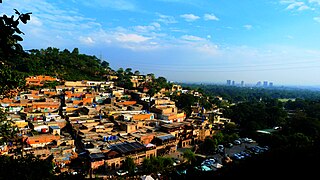
Saidpur is a village and union council (UC-1) located in a ravine in Pakistan in the Margalla Hills, near the Daman-e-Koh overlook, in the Islamabad Capital Territory. It is a Mughal Era village that has a wide spectrum of religious and cultural heritage. It serves as a tourist spot for locals as well as foreigners.
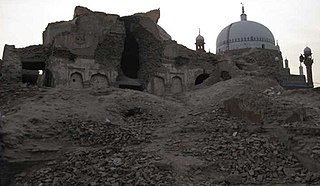
Prahladpuri Temple was a Hindu temple located in Multan city of Punjab province in Pakistan, adjacent to the Shrine of Bahauddin Zakariya. Named after Prahlada, it is dedicated to the Hindu deity Narasimha. The site is currently owned by Evacuee Trust Property Board.

Shivala Teja Singh temple is a historic Hindu temple in the Sialkot city of Punjab province of Pakistan. The temple was built by Teja Singh. It is dedicated to Shiva.
Shri Krishna Mandir, still under construction, is the first Hindu temple to be granted permission to be built in Islamabad, capital of Pakistan, on 0.5 acre land in the H-9 area of Islamabad Capital Territory. It will be a place of worship for the 3,000 Hindu families living in Islamabad. The temple will be managed by the Pakistan Hindu Panchayat. The construction of the temple is controversial: since the approval the construction was challenged by many Islamic extremists and the construction site has been attacked and vandalised four times.
Shri Krisha Temple is a Hindu temple located in the Sadiqabad Tehsil in the Rahim Yar Khan District in the Punjab province of Pakistan. The temple is famous for the Krishna Janmastami celebration which is participated by Hindus from Sindh and Southern Punjab. The Janmastami festival lasts for 2-3 days and a big mela is conducted. In 2017, the Punjab government released money for the renovation of the temple.
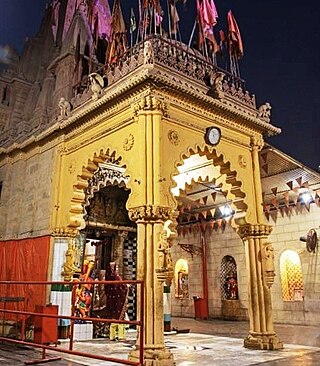
Shri Panchmukhi Hanuman Mandir is a historic Hindu temple in Pakistan. It is located in the Soldier Bazaar in Karachi in the Sindh Province of Pakistan It is a 1,500 year old temple. It is the only temple in the world that has the natural statue of Lord Hanuman. It is declared as a national heritage under the Sindh Cultural Heritage (Preservation) Act 1994.
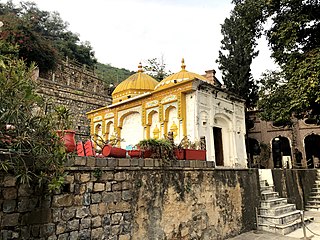
Rama Temple, also known as Ram Kund Temple, is situated in Saidpur Village, Islamabad, Pakistan. The temple is dedicated to the Hindu God Rama, who Hindus believe lived in the area with his family during 14 years of their exile. The temple was built in the 16th century by Man Singh I.
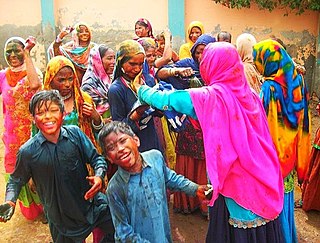
Hinduism is a minority religion in Punjab province of Pakistan followed by about 0.2% of its population. Punjab has the second largest number of Hindus in Pakistan after Sindh. Hinduism is followed mainly in the Southern Punjab districts of Rahim Yar Khan and Bahawalpur.

